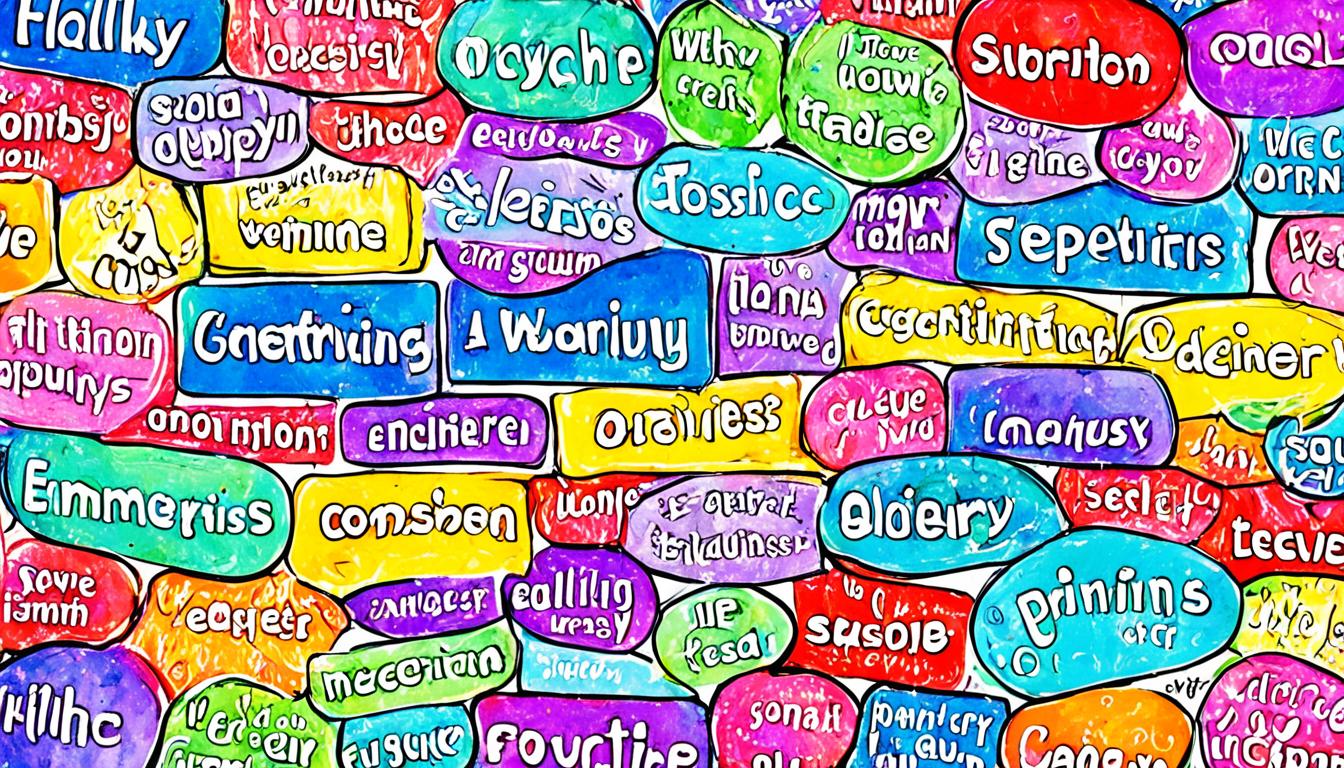When it comes to building and maintaining healthy relationships, communication is key. And one powerful tool in a couple’s communication arsenal is the use of describing words. Describing words, also known as adjectives, can help us express our feelings and thoughts more precisely, and thus deepen our intimacy and understanding with our partner. In this article, we will explore 50 relationship describing words that can help you strengthen your bond with your loved one.
Key Takeaways:
- Describing words, also known as adjectives, are valuable in expressing your feelings and thoughts more precisely in a relationship.
- Using describing words can deepen intimacy and understanding with your partner.
- We will explore 50 relationship describing words that can help strengthen your bond with your loved one.
The Importance of Describing Words in Relationships
Describing words are essential for effective communication in any relationship. They allow you to express your emotions, thoughts, and observations in a more nuanced way than simple statements and commands do. By using adjectives when describing your partner and your relationship, you can add color, texture, and depth to your conversation, and thus, create a space for mutual understanding and empathy.
Moreover, using descriptive language can also help us identify and address potential issues in our relationship. For example, if you consistently describe your partner as distant or unresponsive, it may indicate a need for more emotional connection and communication. On the other hand, if you use positive adjectives to describe your partner, such as caring or supportive, it can reinforce those behaviors and strengthen your bond.

Using describing words can add depth and understanding to your relationship.
How Describing Words Can Help Build Trust in Your Relationship
Trust is a fundamental ingredient in any healthy relationship. When we describe our partner and our relationship positively and specifically, we signal to them that we see and appreciate their unique qualities, strengths, and efforts. This recognition can foster a sense of validation and safety in the relationship, which can in turn promote trust and emotional connection.
Using describing words in your communication allows you to convey your admiration and respect for your partner. It demonstrates that you value their presence and contributions to the relationship. By expressing your appreciation through positive adjectives, such as “kind,” “supportive,” or “thoughtful,” you build a foundation of trust and reinforce the belief that you see them for who they truly are.
Describing words also play a crucial role in clarifying expectations and reducing misunderstandings in a relationship. When we use specific words to describe our feelings and needs, we paint a clearer picture of our desires and aspirations. This level of clarity enhances communication and enables both partners to better understand and fulfill each other’s expectations.
Furthermore, employing descriptive language when communicating facilitates a deeper level of understanding and empathy between partners. By using words that accurately capture our emotions and experiences, we enable our partner to gain insight into our perspective. This understanding fosters mutual respect and allows for more meaningful connections.

The image above beautifully illustrates the importance of trust in a relationship. Just as each individual link supports the others to form a strong chain, trust acts as the binding force that holds a relationship together. By incorporating describing words into your interactions, you strengthen the links of trust and support within your partnership.
The Power of Positive Adjectives in Relationship Building
Positive adjectives play a crucial role in creating and maintaining healthy relationships. They have the power to affirm your partner’s good qualities, celebrate shared experiences, and evoke positive emotions. By using positive adjectives, you can effectively communicate your love, support, and appreciation for your partner, strengthening the emotional connection and intimacy in your relationship.
When you describe your partner as “loving” or “supportive,” you convey that you see them in a positive light and value the contributions they bring to your relationship. This affirmation fosters a sense of security and closeness, nurturing trust and mutual fulfillment.
Including positive adjectives in your daily interactions creates an atmosphere of love and support. It enables you to focus on the good qualities of your partner, enhancing your emotional bond. This positivity not only benefits your relationship, but also uplifts both you and your partner individually, fostering personal growth and self-esteem.
For instance, consider the impact of expressing how you feel when your partner goes out of their way to make you smile. Using positive adjectives such as “thoughtful” or “kind-hearted” communicates your appreciation and reinforces their behaviors. This type of affirmation strengthens the emotional connection, reinforcing the positive aspects of your relationship.

Negative Adjectives to Avoid When Describing Your Partner
While effective communication in a relationship often involves the use of adjectives, it’s important to be mindful of the impact that negative adjectives can have. Negative adjectives such as “angry,” “annoying,” or “selfish” can hurt your partner’s feelings, breed resentment, and trigger defensiveness, which can lead to conflicts. To maintain a healthy and supportive relationship, it’s crucial to avoid using these negative adjectives when describing your partner.
Instead, try using positive adjectives to highlight the qualities and behaviors you appreciate in your partner. By focusing on the positive aspects, you can foster open and constructive communication that strengthens your connection. For instance, instead of saying, “You never listen to me,” you could express your concerns by saying, “I feel unheard when you interrupt me during conversations.”
This approach allows you to communicate your feelings without attacking your partner, encourages empathy and understanding, and opens up opportunities for honest dialogue. By using positive adjectives and expressing your concerns in a constructive manner, you create a safe space for both partners to share their feelings and work through conflicts in a healthy way.

Conclusion
In conclusion, incorporating describing words into your relationship can have a profound impact on the quality of your communication, level of trust, and emotional connection with your partner. By using positive adjectives to express your thoughts and feelings, you can create a more supportive and loving environment where both you and your partner feel valued and appreciated. Additionally, by avoiding negative adjectives, you can prevent potential conflicts and promote understanding.
Remember that effective communication is a skill that requires effort and practice. Be patient with yourself and your partner as you strive to incorporate these describing words into your daily interactions. Over time, they will become a natural part of your language, strengthening your relationship and helping you both feel seen, heard, and understood.
So, why wait? Start incorporating describing words into your conversations today and witness the positive transformation they can bring to your relationship. Trust, communication, and connection are within your grasp, and using the power of words is the key to unlocking them.
FAQ
How can describing words help strengthen my relationship?
Describing words, also known as adjectives, can help you express your feelings and thoughts more precisely, deepening your intimacy and understanding with your partner. By using adjectives to describe your partner and your relationship, you can add color, texture, and depth to your conversation, creating a space for mutual understanding and empathy. Additionally, descriptive language can help you identify and address potential issues in your relationship.
How can describing words contribute to building trust in a relationship?
When you use positive and specific describing words to talk about your partner and your relationship, you show them that you see and appreciate their unique qualities, strengths, and efforts. This recognition fosters a sense of validation and safety, promoting trust and emotional connection. Descriptive language can also clarify expectations and reduce misunderstandings, allowing for more effective communication and greater understanding.
How can positive adjectives improve my relationship?
Positive adjectives affirm your partner’s good qualities and achievements, celebrate your shared experiences, and evoke positive emotions. When you use positive adjectives like “loving” or “supportive,” you communicate to your partner that you see them in a positive light and value their contributions to the relationship. This fosters a sense of security and closeness, leading to a stronger and more fulfilling relationship.
Should I avoid using negative adjectives when describing my partner?
Yes, it’s important to avoid using negative adjectives such as “angry,” “annoying,” or “selfish” when describing your partner. Negative adjectives can create feelings of hurt, resentment, and defensiveness, and may even lead to conflict. Instead, try using positive words to describe your partner and communicate your feelings and concerns in a constructive way, focusing on how their behavior makes you feel rather than attacking them.
How can describing words enhance communication and deepen the emotional connection in my relationship?
Using describing words in your relationship can enhance communication by adding nuance and depth to your conversations. By expressing your emotions, thoughts, and observations through descriptive language, you can create a more supportive and loving environment. This helps you and your partner feel seen, heard, and valued, deepening your emotional connection.
Source Links
- https://www.attractiondiary.com/words-to-describe-your-girlfriend/
- https://www.healthline.com/health/types-of-relationships
- https://www.allohealth.care/healthfeed/sex-education/relationship-describing-words


